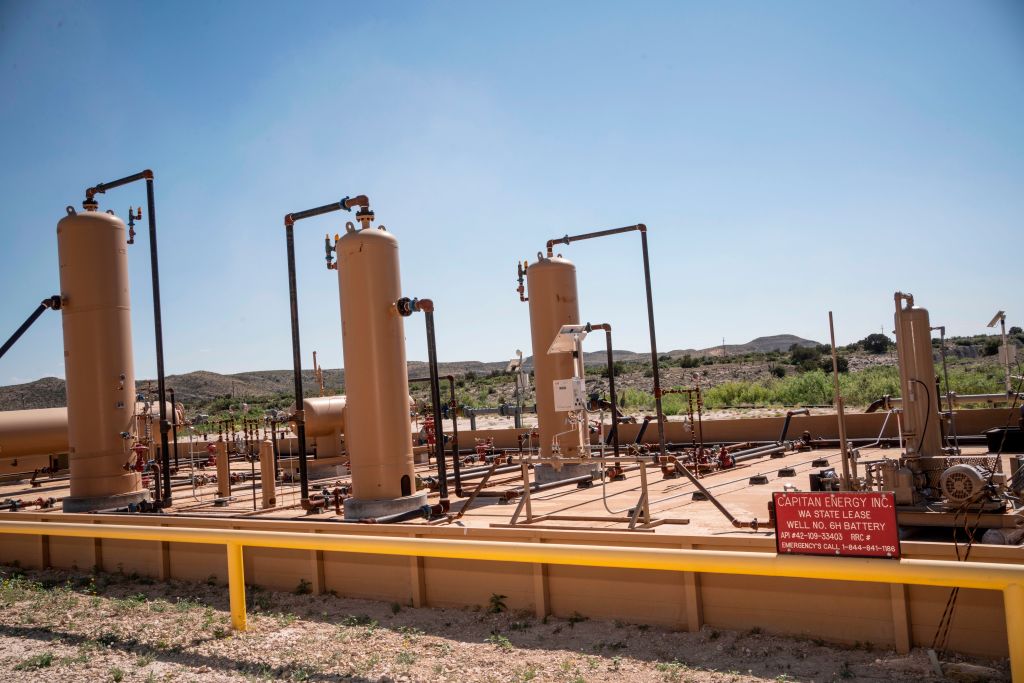Boris Johnson is considering doing something that should be a duty for every leader. In the wake of sanctions poised to disrupt the 8 percent of domestic oil and 18 percent of diesel the UK imports from Russia, Johnson is reportedly toying with the idea of putting his country first and on the road to self-sufficiency by lifting the UK’s moratorium on fracking.
The British government banned hydraulic fracturing, or “fracking,” in 2019. Fracking is a method of extracting oil and natural gas by drilling deep underground and fracturing shale rock with a fluid mixture (99 percent water and sand) that allows fossil fuels to flow out, be captured, processed and used to myriad ends (including gasoline). Citing concerns about earthquakes (the intensity of which have been likened to the seismic equivalent of “someone sitting down in a desk chair”), the British government ordered fracking company Cuadrilla Resources to shut down and plug the last two shale gas wells left in England.
The government gave Cuadrilla a deadline of June 30 to fill its wells with concrete, but now they’re saying, “Not so fast.” Johnson is said to be looking at “all options” as part of the UK’s new energy strategy. The Guardian reports that Johnson’s business secretary Kwasi Kwarteng told the House of Commons, “In conversation with my right honorable friend the prime minister, we were clear that it didn’t necessarily make any sense to concrete over the wells. We’re still in conversations about that.”
Meanwhile, in the States — where fracking was invented — President Biden is patting himself on the back for having issued an executive order banning fracking on public lands, while simultaneously trying to beg other countries, who won’t answer his phone calls, to help us out. After denouncing Russia’s behavior against Ukraine and issuing sanctions, Biden took his sweet time in actually banning the importation of Russian oil, because though the president has professed a belief that energy industry workers should be in jail and that we’re going to “get rid of fossil fuels,” his actions speak louder than his campaign talking points. And right now, they’re screaming, “Fossil fuels are only yucky when they’re extracted in my own backyard — in view of my constituents.”
It’s maddening that it must always take a crisis for world leaders to realize the downsides of globalization, but while Biden dithers with contradictory policies (he is “racing to deploy clean energy,” but brags about how much oil the US produced during his first year in office), at least Johnson is open to reason. Should the prime minister — who once called fracking “glorious news for humanity” — open fracking back up in the UK, does that mean he suddenly doesn’t care about the environment? Or does he realize that, in this instance, the very minimal price the UK may pay environmentally for fracking is nothing compared to the high human price his country will certainly pay if he heeds the unfounded hysterics coming from a group of greenies?
Everything has its price. It is time Biden decided, as Johnson is doing, what the environment’s price tag is, and whether it’s higher than that of the people who rely on its resources for survival.
It’s an obvious choice. For one thing, fracking is safe. The Environmental Protection Agency issued a report in 2015 that concluded the agency “did not find evidence that [fracking has] led to widespread, systemic impacts on drinking water resources” in the US.
Fracking is also highly regulated. Rest assured, environmental and public health bureaucrats do their darndest to make fracking as difficult as possible, inventing an ever-growing number of state and federal laws, permits, and red tape thicker than any shale rock formation.
And the benefits of fracking are enormous and far-reaching. Western Pennsylvania is situated on the Marcellus Shale, a rock formation full of natural gas reserves. Fracking really took off in this region, where I’m from, around 2008. I was working as a waitress during a summer home from college when the boom was at its height. I remember serving Dr. Pepper to men with southern drawls and muddy boots (they were from Texas, and Texans love their Dr. Pepper) and seeing their big trucks all over town. A 30,000-square-foot building that had been used to build trucks when coal was king in the 1980s was suddenly occupied again, this time by an international well drilling company.
My sleepy town didn’t experience the same prosperity as some in Pennsylvania and North Dakota did, but the economic boost was undeniable. When then-governor Andrew Cuomo banned fracking in New York in 2014, people said you could stand on the border and see the prosperity in Pennsylvania and the poverty in New York.
Even now, as the fracking boom has died down from record levels, and government policies continue to impede production, fracking remains an astoundingly influential asset. Forbes reports that fracking “saved American residential, commercial, and industrial gas users a staggering $650 billion in energy costs from 2008-2018 alone.” An American Petroleum Institute report outlines how a ban on fracking and federal leases would negatively affect nearly every aspect of American life and would likely trigger a recession.
It’s also worth noting that as we grow our dependence on electricity, and we’re all forced to drive Teslas, we’ll need to source our electricity from power plants that rely on one of two fossil fuels: coal or natural gas. Many coal plants converted to natural gas during the Obama administration. And how do we get natural gas? By fracking.
Finally, in a drop the mic moment, the U.S. Department of Energy’s Office of Fossil Energy issued a report outlining the “severe consequences” of Biden’s proposed ban on fracking,
including the loss of millions of jobs, price spikes at the gasoline pump and higher electricity costs for all Americans — and the likelihood of increased CO2, SO2, and NOx emissions. A ban would end the U.S. role as the world’s largest oil and natural gas producer and would force the United States to become a net importer of oil and gas once again. It would weaken the Nation’s geopolitical influence and put our national security at risk.
Decreasing your nation’s dependence on other countries is always a good idea. And doing so when one of those countries’ leaders has nukes and isn’t afraid to use them seems as good a time as any.

























